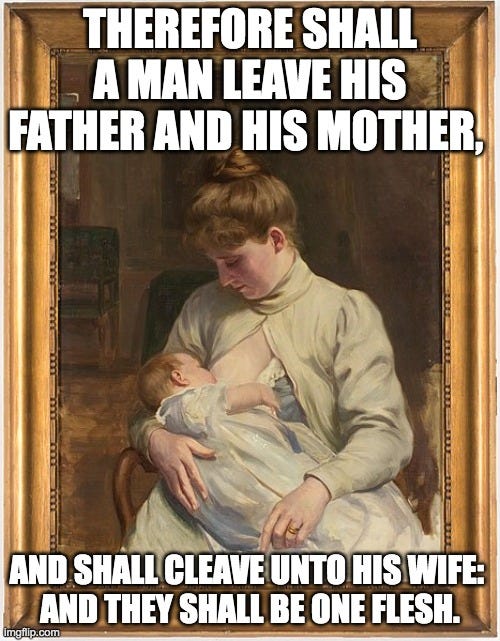So Andrew has written his latest post in our marriage exchange and if he were titling it as I do, he might well have titled it ‘Marriage is Commitment’. (The actual title was ‘The Covenant Continues’. See below for links to the entire series of letters.)
At the end of his post he writes a challenge to me, calling on me to answer the following questions:
In a world where commitments are often fleeting, how do we ensure that the sanctity and permanence of the marital covenant are upheld?
How do we, as a society and as individuals, nurture and protect this sacred bond in the face of modern challenges?
"Let us hold unswervingly to the hope we profess, for he who promised is faithful." - Hebrews 10:23
Now one thing that struck me right away was that, in all of the verses he posted, there was not one word said about ‘commitment’. Indeed while the word ‘commit’ (meaning, to act) is used 75 times in the KJV, the word ‘commitment’ is never used.
Now that, in itself, is not fatal to his argument. The word ‘trinity’ never appears, but serious Bible scholars can show you several places where the concept comes out. But it is, at least, a hesitation. What if the word ‘commitment’ is not the best word?
Let me suggest that it isn’t. Let me suggest that the word he was looking for is ‘obedience’. And let me suggest that the word ‘obedience’ actually helps answer the questions he poses.
Blast from the past
I would like you all to go back with me to a time in the distant past when I had young children running around my house. My wife, seeing an overflowing trash can, and knowing that idle hands are the devil’s workshop, would sometimes say to one of my children, “Would you like to take out the trash?”
I would see the child’s mouth open and, before they had a chance to dig themselves into a hole, would say “Translation: Take the trash out or she’s whipping your behind.” Results? No long winded arguments about the linguistic meaning in this context of ‘would you like’ and one fewer overflowing trash can.
Our society is notoriously weak on the subject of authority. (And whipping behinds. I think they are related.) Thus our society doesn’t understand the power of the word ‘obedience’.
When we speak of marriage, using all of the verses that Andrew used in his post, our society fails to see that all of these verses are ‘obedience’ verses
A brief discursion into linguistics
I can just hear some of my audience shouting “Von, the verses don’t use the word ‘obedience’ either! Nyah, nyah!” (I have a highly intelligent and easily entertained audience.) So I need to explain such exoteric issues as implied subject and command tense. (Or mood or whatever.)
"Love the LORD your God and keep his requirements, his decrees, his laws and his commands always." - Deuteronomy 11:1
Let us examine this sentence linguistically. The first thing to notice is that it begins with the word ‘you’. What, you don’t see it? That’s because it is ‘implied’. We linguists write that like this ‘(you) love the LORD your God…” (Or, (ye) I suppose.) That tells us who the sentence is talking to. It is talking to ‘you’, the audience.
And now we get into the tense, or mood, or whatever. It is in ‘command’ form. So written out longer it means, “I am telling you that you are supposed to Love the LORD your God…” Or, in longer prose, “If you Love the LORD your God you will be obeying my command.”
Contrariwise when the author of Hebrews says, “Let us hold…” he is not asking someone to allow this, there is no implied ‘you’ there. The subject is ‘us’, and he is telling ‘us’ to hold. He is, in a word and to the extent of his authority, commanding it.
Back to Obedience
So the verses that Andrew posted are either stating a fact, commanding an individual, commanding a group or… wait a minute. What about Joshua?
"But as for me and my house, we will serve the LORD." - Joshua 24:15
Isn’t that a commitment? Well… maybe. First of all, it isn’t written as one. It is written as a statement of fact. Secondly, there is one man speaking, but he is speaking of the actions of an entire ‘house’ (a large word in Scripture, possibly including dozens of people or even more). In other words, he is claiming not only the right, but the power, to command his house in such a way that they will serve the LORD.
And, of course, the verse itself is about obedience! Serving the LORD!
So, no, I’m back to obedience
How does obedience help?
One of the problems with our current age is that everything depends on ourselves and our emotions. While I like the word ‘commitment’, I’m afraid that, in modern ears, it translates into ‘feelings’ much more easily than it translates into ‘obedience’. When our modern audience hears someone say ‘He is committed to his marriage’ they much more easily hear, “He has a lot of strong feelings about the importance of his marriage’ then they hear ‘He will work on his marriage regardless of his feelings.”
I was once counselling a man about his marriage, and he said to me, “Von, I’m afraid I don’t love my wife anymore.” I replied, “Well, you had better start.”
Because, you see, Biblical Love is not a feeling. Indeed it is something you do counter to your feelings! The Scriptures say “Love is patient”. Well, what does it mean to be patient? It means to continue to be kind and gentle to someone… when they are driving you mad! When they keep doing the same dumb thing, or wrong thing, or disobedient thing over, and over, and over, and over and you keep correcting them and they keep not getting it…
It isn’t patience if it is easy! It isn’t patience if it accords with what you want to do! You cannot be ‘long-suffering’ if you aren’t suffering.
!
“I have known many happy marriages, but never a compatible one. The whole aim of marriage is to fight through and survive the instant when incompatibility becomes unquestionable. For a man and a woman, as such, are incompatible.”
―G. K. Chesterton
I’m afraid that a large number of our modern audience, when they hear the word ‘commitment’, imply a kind of ‘I should try to continually feel like…” which is not only nonsense, but not what the word means. Whereas when they hear ‘obey’, they jolly well know that we aren’t talking about what you already want to do, what accords with your feelings.
When the modern reader reads Solomon telling the man to rejoice always with the breasts of his wife, they are tempted to say, “Oh, so he is telling us to make love when we both feel like it.” To which I respond, “No! If you both felt like it he wouldn’t have to tell you to do it! He is telling you to make love even when you don’t feel like it!”
Isa 45:9 Woe unto him that striveth with his Maker! Let the potsherd strive with the potsherds of the earth. Shall the clay say to him that fashioneth it, What makest thou? or thy work, He hath no hands?
Back to Covenant
So this is the nature of the covenant, and our response to it. God has created marriage, and he has created it with certain obligations. However we ended up in a marriage, our job is to fulfil those obligations. How can we point our society back to their obligations in marriage? By helping them understand that they are obligations. That there is a God, Who created a universe, and in that universe He created a lot of relationships, and among those is the relationship of marriage. And that failing to live up to our obligations in marriage will not only destroy our personal life and our society, but it will get Him rather miffed with us.
Thank you for reading Von’s Substack. I would love it if you commented! I love hearing from readers, especially critical comments. I would love to start more letter exchanges, so if there’s a subject you’re interested in, get writing and tag me!
Being ‘restacked’ and mentioned in ‘notes’ is very important for lesser-known stacks so… feel free! I’m semi-retired and write as a ministry (and for fun) so you don’t need to feel guilty you aren’t paying for anything, but if you enjoy my writing (even if you dramatically disagree with it), then restack, please! Or mention me in one of your own posts.
If I don’t write you back it is almost certain that I didn’t see it, so please feel free to comment and link to your post. Or if you just think I would be interested in your post!
If you get lost, check out my ‘Table of Contents’ which I try to keep up to date.
Von also writes as ‘Arthur Yeomans’. Under that name he writes children’s, YA, and adult fiction from a Christian perspective. His books are published by Wise Path Books and include the children’s/YA books:
The Bobtails meet the Preacher’s Kid: A Christian historical fiction chapter book about four orphans who go to live with their aunt on a dairy farm.
The Bobtails and the Cousins: The sequel to Preacher’s Kid. The aunt has married, and the cousins come to visit. Meaning town kids dealing with chores and manure and…
The Bobtails go to France: The sequel to cousins. The Bobtails, and Preacher’s Kid, get to take a trip to New York, London, Paris, and a small town in France. To get some cheese.
and
No Ordinary School: A brilliant but socially clueless boy gets recruited for a special school. Where he makes a lot of money, gets a girl, and solves a mystery.
As well as GK Chesterton’s wonderful book, “What’s Wrong with the World”, for which ‘Arthur’ wrote most of the annotations.
Arthur also has a substack, and a website. On the substack you can listen to some of his published books. Free.
Thanks again, God Bless, Soli Deo gloria,
Von
Links
I encourage everyone to read the entire exchange.
What Is Marriage #1A (Dad Explains) Questions on what marriage is / How marriage has changed / Legal vs. Religious Questions
What Is Marriage #1B (Von) Asked and answered “Is Marriage Real?”
What Is Marriage #2A (Dad Explains) Expands on marriage being real within the framework of “names” or nomenclature.
What Is Marriage #2B (Von) Marriage is a sexual union. That’s not all it is (by a long chalk), but that is its core.
What is Marriage #3A (Dad Explains) Asks the question, “Is marriage solely about children or are children a critical part of marriage itself?” and raises the spectre of infertile couples.
What is Marriage #3B (Von) “Marriage is… ordained by God for the purpose of producing a Godly seed…”
What is Marriage #4A (Dad Explains) Andrew summarizes a bunch of his thoughts and adds several aspects
What is Marriage #4B (Von) Marriage is a covenant. Also, post more scripture!
What is Marriage #5A (Dad Explains) All about commitment.
What is Marriage #R1B (Von) A bit of a discursion deeper into covenant
What is Marriage #5B (Von) This post. Scroll up to read it.










